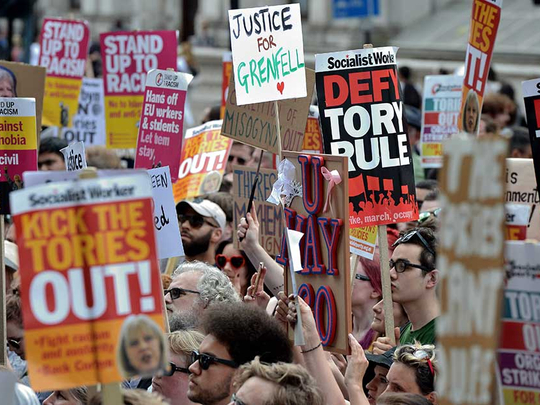
The United Kingdom begins today formal exit negotiations with the EU in Brussels. The milestone moment heralds the start of the second, historic chapter of the long-running Brexit saga.
Since last June’s referendum, there has been much international attention on sometimes heated intra-UK debates about leaving the EU which were re-played in this month’s general election. It is already clear that the Brexit vote was the most important moment in UK politics for many years and has defined Theresa May’s now-shaky premiership.
Yet, the real negotiating action is only just about to begin. And when it does today, attention will shift from UK internal discussions over Brexit to the unfolding drama between the United Kingdom and EU-27.
For June’s referendum also kicked off informal discussions between Brussels and London, and also within the remaining EU too as it works out its post-Brexit identity. Indeed, how the EU changes because of the UK’s departure could potentially be the most important, but to date frequently overlooked, outcome of last June’s referendum.
The forthcoming formal stage of negotiations between the United Kingdom and the EU encompass key elements of what could prove to the most complex ever peacetime negotiation that London has ever undertaken. The negotiations cover multiple areas, including the contours of any UK exit deal agreed with the EU; Brexit transitional arrangements; and the parameters of the newly defined UK-EU relationship.
This is a massive agenda, and the most definitive statement yet from Brussels came from the EU Commission’s Chief Negotiator Michel Barnier when he said that any exit deal should be reached by October 2018, mirroring comments from the European Parliament’s Chief Negotiator Guy Verhofstadt. This implies an extremely tight window for formal negotiations, and Barnier has also then proposed four to five months for ratification. This timetable, which could potentially get extended beyond two years if all 27 remaining EU member states agree, is especially short given that it is unlikely that fundamental decisions can be taken until after the German elections this September.
The limited timeframe offered by Article 50 has led May to suggest an “implementation phase” to help smooth Brexit. Such a period will help give time to transition to new political and regulatory frameworks, although some English politicians, including former United Kingdom Independence Party leader Nigel Farage have slammed this option as “backsliding”.
Barnier has said that he is open to the idea of an implementation phase. However, he has also declared that “until we know what the intentions of a request from the United Kingdom are, what they would like and what they are prepared to accept with this new partnership, it’s going to be difficult to talk about a transitional period”.
Key elements of any exit deal will include vexed issues such as the legal status of EU and UK citizens going forward in each other’s jurisdictions, and the UK’s EU ‘divorce bill’. This latter issue, alone, has potential to wreck negotiations with the EU asserting claims of tens of billions given that in excess of €300 billion (Dh1.23 trillion) of shared payment liabilities need to be settled.
The status, post-Brexit, of UK and EU citizens, is another thorny issue. May had offered an early deal whereby she would guarantee rights of EU citizens already living in the UK, as long as the same is reciprocated for UK citizens living in one of the 27 other states. Brussels, however, has refused to explore this issue to date.
Complicated as this exit agreement might prove, it could be more straightforward than agreeing specifics of a deal defining the new UK-EU relationship. May asserted in a landmark speech on January 17 she does not want to keep “bits of the EU”, but would like a “bold, ambitious free trade agreement” with “the freest possible trade on goods and services”; a new customs agreement that would allow for “tariff-free trade with Europe and cross border trade that is frictionless as possible”, while leaving the Common Commercial Policy and no longer been tied to the Common Commercial Tariff. At the same time, she aims to take back full control of immigration policy, and end the European Court of Justice’s jurisdiction in the United Kingdom.
It is very unclear whether these, collective, negotiating demands can be realised from the EU in the two year timeframe of Article 50. This is especially so given May’s weakened political standing after this month’s UK general election where she lost her parliamentary majority. Much is now beyond May’s power, resting on whether the remaining 27 EU states will offer outlines of such a deal on attractive enough terms.
European Commission President Donald Tusk has said that her landmark Brexit speech in January showed she is becoming “more realistic” about some of the trade-offs that will be necessary in the negotiations. And much could now depend on the flexibility of both sides, and here it is interesting to note, for instance, that the UK’s Secretary of State for Brexit David Davis has said that the government would consider making a continuing EU financial contribution to “get the best possible access for goods and services to the European market”.
Even with goodwill from both sides, Lord Kerr of Kinlochard, the author of the Article 50 clause, has asserted that there is at least a one in three chance that no overall agreement will emerge. Moreover, given the likely differences between EU and UK positions, he also assesses only a 50 per cent likelihood of an orderly Brexit within a two year timeframe.
The stakes in play are therefore huge and historic not just for the United Kingdom but also for the EU. Delivering a smoother departure needs clear, coherent strategy and thinking so all parties can move toward a new constructive partnership that can hopefully bring benefits for both at a time of significant global geopolitical turbulence.
Andrew Hammond is an Associate at LSE IDEAS at the London School of Economics.









